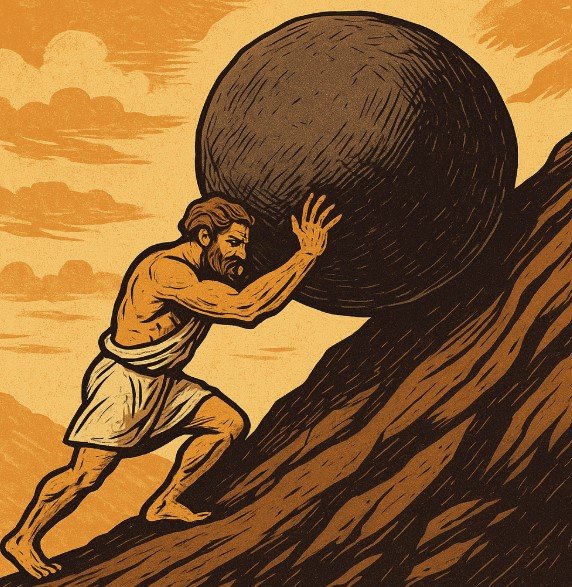Are you constantly exhausted? Feel like you’re drowning in daily tasks? Can’t shake the feeling that everything is just too much? Overwhelmed and burned out? You’re not alone — and help is available today through online therapy.
When Life Feels Too Heavy to Handle
You wake up tired, not because you didn’t sleep, but because your mind never rested. The day ahead feels overwhelming, and even the smallest tasks seem insurmountable. You’re staring at a growing to-do list while feeling like you’re falling further behind. You meet deadlines at work, take care of your family, manage bills — but inside, you’re running on empty.
This isn’t laziness or weakness. It’s burnout. And it’s more common than you think.
Your Body and Mind Are Sounding the Alarm
When you’re overwhelmed, your body sends clear signals, even if your mind tries to ignore them. You might feel a constant fatigue that sleep can’t fix. Headaches become frequent visitors. You might notice your stomach acting up or that you’re getting sick more often. These are signs that your nervous system is stuck in survival mode.
Emotionally, you may feel numb, disconnected, or like you’re just going through the motions. You snap at the people you love or burst into tears for no clear reason. That heaviness in your chest? That sinking feeling in your stomach? Those are signs, too.
Mentally, everything becomes harder. Decision-making feels impossible. You forget important tasks, and your mind races with what-ifs and worst-case scenarios. That internal voice telling you you’re failing? It’s not telling the truth — but it is a sign that you need support.

Feeling overwhelmed and burned out? If you’re searching for online psychiatry services that are accessible, effective, and designed for your busy life, you’re in the right place. East Coast telepsychiatry brings virtual mental health care right to your fingertips, offering flexible scheduling and compassionate support.
The Myth of “Pushing Through”
The myth of Sisyphus, a figure from Greek mythology, is often invoked to describe the experience of “pushing through” in the face of seemingly futile or endless labor.
Our culture tells us to push harder, to hustle, to be strong no matter what. But when you’re burned out, pushing through can actually make things worse. Performance drops. Relationships suffer. Your health declines. And soon, what felt like manageable stress spirals into a full-blown crisis.
This cycle is exhausting and unsustainable. You feel overwhelmed, so you try to do more. But doing more drains you further. Eventually, your body and mind crash. Breaking that cycle takes intention and support — not just more effort.
Your Feelings Are Real — and Valid
Many people in burnout question themselves. “Am I just being dramatic?” “Other people have it worse.” But emotional pain isn’t a competition. If daily life feels like too much, if you’re not enjoying the things you used to, or if you’re feeling isolated even around others — your experience is real, and it matters.
You don’t have to hit rock bottom to ask for help. You deserve support simply because you’re struggling. And help is more accessible than ever.
What Burnout Really Looks Like in Daily Life
Burnout at work often shows up as dread — that sinking feeling when Monday rolls around. You might feel disconnected from your job, cynical about your coworkers, or physically ill just thinking about logging in. You put in longer hours, yet get less done, and wonder why you can’t just “snap out of it.”
In your personal life, even simple decisions can feel monumental. You constantly feel behind. Guilt creeps in anytime you rest. You might notice that you always put others first, even when you’re barely holding it together yourself. And then there’s the voice that says, “I used to be able to handle all of this — what’s wrong with me?”
Burnout also strains relationships. You might avoid social plans or feel irritated by normal conversation. Even when surrounded by others, you may feel deeply alone. You’re not cold — you’re overwhelmed and depleted.
Waiting to Get Help Has a Cost
Left untreated, burnout can lead to serious complications. Stress can evolve into anxiety disorders or clinical depression. Physical health suffers too — with higher risk for cardiovascular issues, weakened immunity, and chronic fatigue.
Relationships may break down. Work performance may continue to drop. Financial stress and emotional disconnection follow. What begins as burnout ends in burnout plus crisis. But there’s good news: early intervention works. The sooner you reach out, the quicker your recovery.
Online Mental Health Support Makes Healing Easier
For many people, the biggest barrier to therapy isn’t willingness — it’s access. Traditional therapy often comes with long wait times, inflexible schedules, transportation hassles, and extra costs like parking or childcare. When you’re already burned out, these obstacles can feel impossible to overcome.
Online therapy removes many of these hurdles. You can attend a session from your home, your car, or even your office during a break. Appointments are available during evenings and weekends. And there’s no traffic, weather, or commute to stress over.
You also have options. Prefer face-to-face interaction? Video sessions are available. Need more flexibility? Phone or text-based therapy may be a better fit. In crisis? Immediate support through messaging or chat can provide a lifeline.
Research shows that online psychiatry services are just as effective as in-person care for conditions like depression, anxiety, and stress-related burnout. You’re not sacrificing quality — you’re gaining convenience and access.
Therapeutic Approaches That Help
There’s no one-size-fits-all solution for burnout. But several therapy modalities are especially effective:
Cognitive Behavioral Therapy (CBT) helps you challenge negative thought patterns, build healthy routines, and set boundaries without guilt. It’s particularly helpful for perfectionists and people-pleasers.
Acceptance and Commitment Therapy (ACT) teaches you how to hold space for difficult emotions without letting them control you. It focuses on clarifying your values and building a life aligned with what really matters.
Mindfulness-Based Stress Reduction (MBSR) cultivates presence and calm. Instead of ruminating over the past or fearing the future, you learn how to ground yourself in the now — reducing anxiety and building emotional resilience.
When Medication Might Be Helpful
In some cases, medication can be a powerful ally. If you’re dealing with persistent sleep issues, chronic fatigue, appetite changes, or thoughts of self-harm, a psychiatrist can help evaluate your symptoms. Antidepressants, anti-anxiety medications, or sleep aids can offer much-needed relief when paired with therapy.
Online psychiatry through East Coast Telepsychiatry allows you to consult with licensed professionals who can prescribe and monitor medication — all without needing to leave home.

Whether you’re looking for telehealth psychiatric treatment or affordable virtual psychiatry services near me, our team of licensed online psychiatrists East Coast is here for you. From telepsychiatry in New York to Boston and beyond, we help you navigate burnout, anxiety, and emotional exhaustion. It’s time to get online therapy for burnout and stop feeling overwhelmed by life and work. Learn the signs you need mental health help — and take the first step toward healing today.
Getting Started — What to Expect
Preparing for your first online session might feel intimidating. That’s normal. Before the session, find a private, quiet space. Test your technology and have a notebook, water, or tissues on hand. Once you’re connected, your therapist will guide the conversation, asking about your current experiences and what you’d like to change. You don’t have to have the perfect words — just be honest.
After the session, it’s normal to feel tired or even unsure. Healing takes time. What matters is that you’ve started. Each session builds on the last, helping you uncover new tools, insights, and hope.
Long-Term Resilience is Possible
Therapy is only one piece of recovery. To stay well, you need sustainable self-care and support. That includes setting boundaries around work and relationships, finding ways to manage stress through movement or creative outlets, and staying connected to people who truly listen.
Practice emotional regulation by recognizing your early warning signs — whether that’s irritability, fatigue, or isolation — and respond with compassion instead of self-criticism. Prioritize quality sleep, nutritious meals, and screen-free time each day.
Make time each week for joy, connection, and nature. And once a month, check in with yourself: What’s working? What needs to shift? Where do you need more support?
You Deserve to Feel Better
Right now, countless people are feeling exactly like you do — overwhelmed, exhausted, and unsure where to turn. But those who recover have one thing in common: they asked for help.
Getting support doesn’t mean you’ve failed. It means you’re strong enough to say, “I can’t do this alone anymore — and I don’t have to.”
Ready to Take the First Step?
You’ve made it to the end of this article. That’s not an accident. Something inside you already knows it’s time for a change.
You don’t need to wait until you’re in crisis. You don’t need to keep pushing through the pain. There are licensed online psychiatrists and virtual mental health care professionals ready to help you today — not weeks from now.
East Coast Telepsychiatry provides affordable virtual psychiatry services from New York to Boston, Philadelphia, and across the East Coast. From telehealth psychiatric treatment to personalized therapy and medication support, we’re here to meet you where you are — literally.
Schedule Your First Session Today
Let today be the day you take that first step. Reach out. Talk to someone. Reclaim your peace, your energy, and your joy.
You deserve to feel better — and help is just a click away.
If you are in crisis or having thoughts of self-harm, call or text 988 immediately. Your life matters. Help is here.
